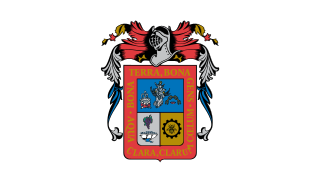 |
|---|
| This article is part of a series on the politics and government of Mexico |
Executive |
Legislative |
| Foreign relations |
Gubernatorial elections were held in fourteen Mexican states on Sunday, July 4, 2010. [1] The gubernatorial elections were held simultaneously with other state and local elections. [1] Elections for governor were held in Aguascalientes, Chiapas, Chihuahua, Durango, Hidalgo, Oaxaca, Puebla, Quintana Roo, Sinaloa, Tamaulipas, Tlaxcala, Veracruz and Zacatecas.

Aguascalientes, officially the Free and Sovereign State of Aguascalientes, is one of the 31 states which, with Mexico City, comprise the 32 Federal Entities of Mexico. It is divided into 11 municipalities and its capital city is Aguascalientes.

Chiapas, officially the Free and Sovereign State of Chiapas, is one of the 31 states that along with the federal district of Mexico City make up the 32 federal entities of Mexico. It is divided into 124 municipalities as of September 2017 and its capital city is Tuxtla Gutiérrez. Other important population centers in Chiapas include Ocosingo, Tapachula, San Cristóbal de las Casas, Comitán and Arriaga. It is the southernmost state in Mexico. It is located in Southeastern Mexico, and it borders the states of Oaxaca to the west, Veracruz to the northwest and Tabasco to the north, and by the Petén, Quiché, Huehuetenango and San Marcos departments of Guatemala to the east and southeast. Chiapas has a coastline along the Pacific Ocean to the south.

Chihuahua, officially the Free and Sovereign State of Chihuahua, is one of the 31 states of Mexico. It is located in Northwestern Mexico and is bordered by the states of Sonora to the west, Sinaloa to the southwest, Durango to the south, and Coahuila to the east. To the north and northeast, it has a long border with the U.S. adjacent to the U.S. states of New Mexico and Texas. Its capital city is Chihuahua City.
Contents
- State Gubernatorial elections
- Aguascalientes
- Baja California
- Chiapas
- Chihuahua
- Durango
- Hidalgo
- Oaxaca
- Puebla
- Quintana Roo
- Sinaloa
- Tamaulipas
- Tlaxcala
- Veracruz
- Zacatecas
- References
- External links
A multi-party alliance between President Felipe Calderón's National Action Party (PAN) and left-wing parties won elections in Oaxaca, Puebla and Sinaloa. [1] [2]

Felipe de Jesús Calderón Hinojosa, is a Mexican politician who served as President of Mexico from 1 December 2006 to 30 November 2012. He was a member of the National Action Party for thirty years before quitting the party in November 2018.

The National Action Party, founded in 1939, is a conservative political party in Mexico, one of the three main political parties in Mexico. Since the 1980s, it has been an important political party winning local, state, and national elections. In 2000, PAN candidate Vicente Fox was elected president for a six-year term; in 2006, PAN candidate Felipe Calderón succeeded Fox in the presidency. During the period 2000-2012, both houses of the Congress of the Union contained PAN pluralities, but the party had a majority in neither. In the 2006 legislative elections the party won 207 out of 500 seats in the Chamber of Deputies and 52 out of 128 Senators. In the 2012 legislative elections, the PAN won 38 seats in the Senate, and 114 seats in the Chamber of Deputies. The members of this party are colloquially called Panistas.
The Institutional Revolutionary Party (PRI), led by Beatriz Paredes, captured Aguascalientes and Tlaxcala from PAN and also picked up the governor's mansion in Zacatecas from the Party of the Democratic Revolution (PRD). [1]

The Institutional Revolutionary Party is a Mexican political party founded in 1929 that held uninterrupted power in the country for 71 years from 1929 to 2000, first as the National Revolutionary Party, then as the Party of the Mexican Revolution, and finally renaming itself as the Institutional Revolutionary Party in 1946.

Tlaxcala, officially the Free and Sovereign State of Tlaxcala, is one of the 31 states which along with the Federal District make up the 32 federative entities of Mexico. It is divided into 60 municipalities and its capital city is Tlaxcala.

Zacatecas, officially the Free and Sovereign State of Zacatecas, is one of the 31 states which, with the Federal District, comprise the 32 Federal Entities of Mexico. It is divided into 58 municipalities and its capital city is Zacatecas City.




